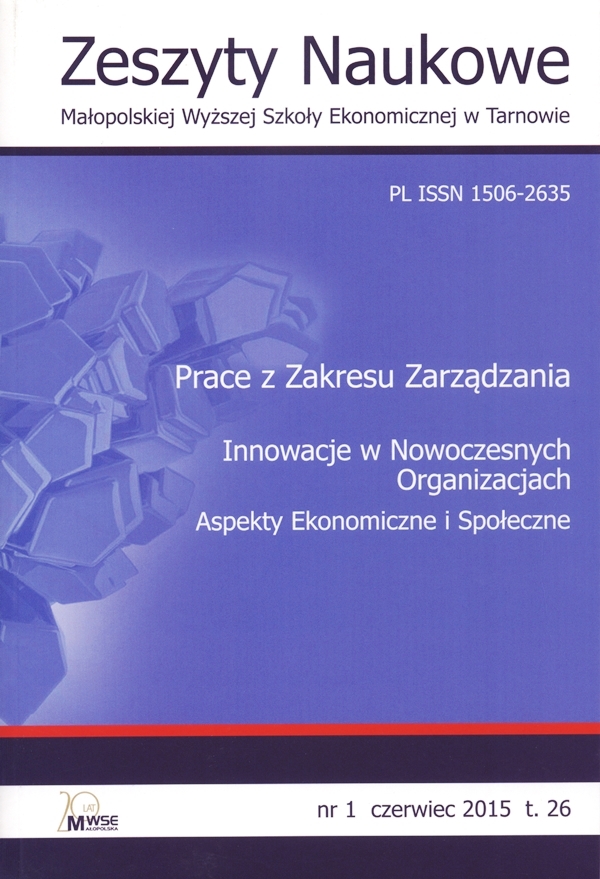Abstract
Extensive changes in the global economy and continuing process of globalization has become one of the most important factors affecting the functioning of countries and companies. Building a competitive advantage, both for the company and the state, became one of the most important tasks for economic policy. Changes in social, political and economic environment in recent years have made and shown that one of the major factors, which every state can have, is the knowledge, also the ability to develop it, extend and implement. The main policy challenge of all countries is the construction of knowledge-based economy and strengthening the innovative attitude, which can provide a competitive advantage for companies, regions and the state. Developed innovation policy has been considered for a long time as a phenomenon proper for developed countries, however, this form of action increasingly occurs and develops in developing countries. In India, the second most populous country in the world, this type of policy has also been developed and adapted to the local conditions. The aim of the article is to explain how the innovation policy is functioning in India, a developing country.
References
Ciok, S. (2009). Polityka rządu wobec wspierania działalności innowacyjnej i badawczo-rozwojowej [online, dostęp: 2014-04-20]. Dostępny w Internecie: www.dawg.pl/files/file/książka6.pdf.
View in Google Scholar
Domanpour, F. (1996). Organizational complexity and innovation: Developing and testing multiple contingency models. Management Science, 42(5), 693‒716.
View in Google Scholar
Drucker, P.F. (1992). Innowacja i przedsiębiorczość. Praktyka i zasady. Warszawa: PWE. ISBN 8320808707.
View in Google Scholar
International Monetary Fund (2014). World Economic Outlook Database, April 2014 [online, dostęp: 2014-04-20]. Dostępny w Internecie: http://www.imf.org/external/pubs/ft/weo/2014/01/weodata/index.aspx.
View in Google Scholar
Jasiński, A.H. (1997). Innowacje i polityka innowacyjna. Białystok: Wydawnictwo Uniwersytetu w Białymstoku. ISBN 8374310103.
View in Google Scholar
Joshi, V., Little, I.M.D. (1996). India’s Economic Reforms 1991–2001. New Delhi: Oxford University Press. ISBN 9780198290780.
View in Google Scholar
Kotler, Ph. (1994). Marketing. Analiza, planowanie, wdrażanie i kontrola. Warszawa: Wydawnictwo Gebethner i S-ka. ISBN 838520542X.
View in Google Scholar
Kozioł, K. (2007). Innowacyjność polskich przedsiębiorstw przemysłowych na tle doświadczeń UE. Rozprawy i Studia. Uniwersytet Szczeciński, 661.
View in Google Scholar
Kumar, Ch. (2011). A discursive dominance theory of economic reforms sustainability: the case of India. India Review, 10(2), 126‒184.
View in Google Scholar
Marciniak, S. (2000). Innowacje i rozwój gospodarczy. Warszawa: Oficyna Wydawnicza Politechniki Warszawskiej. ISBN 9788385964957.
View in Google Scholar
Ministry of Science and Technology (2013). Science, Technology and Innovation Policy 2013 [online, dostęp: 2014-04-20]. Dostępny w Internecie: http://www.dst.gov.in/sti-policy-eng.pdf.
View in Google Scholar
Nowakowska, A. (2010). Regionalna polityka innowacyjna – bilans dziesięcioletnich doświadczeń. W: M. Klamut, E. Szostak (red.). Jaka polityka spójności po roku 2013 (s. 145‒146). Wrocław: Wydawnictwo Uniwersytetu Ekonomicznego we Wrocławiu. ISBN 18993192.
View in Google Scholar
OECD (2005). Oslo Manual [online, dostęp: 2014-04-20]. Dostępny w Internecie: http://www.oecd.org/science/inno/2367580.pdf.
View in Google Scholar
Okoń-Horodyńska, E. (2004). Co z narodowym systemem innowacji w Polsce. W: E. Okoń-Horodyńska (red.). Rola polskiej nauki we wzroście innowacyjności gospodarki. Warszawa: Wydawnictwo Polskiego Towarzystwa Ekonomicznego. ISBN 8388700049.
View in Google Scholar
Plessis, M.D. (2007). The role of knowledge management in innovation. Journal of Knowledge Management, 11(4), 20‒29.
View in Google Scholar
Schumpeter, J.A. (1960). Teoria rozwoju gospodarczego. Warszawa: PWN.
View in Google Scholar
Srinivasan, T.N. (2000). Eight Lectures on India’s Economic Reforms. New Delhi: Oxford University Press. ISBN 9780195652826.
View in Google Scholar
Stawasz, E. (2009). Realizacja i integracja polityki innowacyjnej i przedsiębiorczości (wybrane problemy na przykładzie regionu łódzkiego). W: A. Nowakowska (red.). Budowanie zdolności innowacyjnych regionów. Łódź: Wydawnictwo Biblioteka. ISBN 9788388529597.
View in Google Scholar
Szatkowski, K. (2001). Zarządzanie innowacjami technicznymi. W: M. Brzeziński (red.). Zarządzanie innowacjami technicznymi i organizacyjnymi. Warszawa: Difin. ISBN 8372511977.
View in Google Scholar
Tiwari, R., Buse, S., Herstatt, C. (2007). Innovation via global route: Proposing a reference model for global innovation activities. W: Proceedings of the Second International Conference on Management of Globally Distributed Work (s. 451‒465). Bangalore: Indian Institute of Management.
View in Google Scholar
Virmani, A. (2001). India’s 1990‒91 Crisis: Reforms, Myths and Paradoxes. Working Paper No. 4/2001-Planning Commission. New Delhi.
View in Google Scholar
West, M.A., Anderson, N.R. (1996). Innovation in top management teams. Journal of Applied Psychology, 81, 680‒693.
View in Google Scholar
Wong, A., Tjosvold, D., Liu, C. (2008). Innovation by teams in Shanghai, China: cooperative goals for group confidence and persistence [online, dostęp: 2014-04-20]. British Journal of Management. Dostępny w Internecie: www3.interscience.wiley.com/cgi-bin/fulltext/120123993/HTMLSTART.
View in Google Scholar
© Copyright by Małopolska School of Economics in Tarnów. The articles are available under the Creative Commons Attribution NonCommercial-NoDerivatives 4.0 International License


